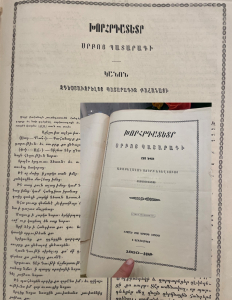Escorted Out: How Dare You?
Armodoxy for Today: Escorted Out
We are in the midst of a period called the Fast of the Catechumens. A catechumen is a recent convert to Christianity who is under instruction before baptism. The Armenian Church accommodated this group during the Divine Liturgy. This accommodation has fallen out of practice in recent times, but the form – the “order” – is still a loud one on Sunday mornings.
During the Holy Divine Liturgy of the Armenian Church, following the Scriptural readings of the day, the deacons let out a chant, “Mi vok herakhayits…” which translates, “Let none of the catechumens, none of little faith and none of the penitents or the unclean draw near to this divine mystery.” In earlier times, at that point, the church building was cleared out of all the catechumens. They were escorted to the front of the church building where instruction in the faith was offered to them. You might think of it as a Sunday School program. It is hard to imagine something like that happening in our churches today. We tend to think of the Church as an open arena for us to come in and out of. How dare anyone escort us out of the church! we think. After all, we argue, Jesus never put restrictions on those who approached him.
Quite true, but this is not about being unwelcomed in the church, as being escorted out the sanctuary may suggest. Instead, think of the seriousness with which the Holy Eucharist, the Holy Communion, was understood by the Christians of earlier times. It was so holy and sacred, that those who were not baptized could not participate. And to be baptized, implied knowledge of the teachings of Christ and the Church.
Looking at the structure of the Divine Liturgy reveals that those who were waiting to be baptized, that is the catechumens, were invited to come to church for the instructional portion of the Divine Liturgy, known as the “jashou,” literally meaning, “The meal.” They would hear the scriptures read and then the priest would give a sermon on the readings. This was the spiritual meal of the day, the jashou. The Creed of the Church (Nicaean) was recited, giving a chance to witness and articulate the Faith. Then the catechumens would be taken out to learn and pray.
Often, when we hear about the rules and regulations of the discipline of the Church we are critical of the moves that do not follow our understanding of the Faith. I mention this small little action practiced by the Church of earlier centuries to emphasize reverence and discipline with which they approached the Holy Sacrament. This, then becomes an opportunity for us to question our sense of reverence and discipline toward the Blessed Body and Blood of Jesus Christ. It is a forgotten part of the tradition of our Church, but an important exercise in the Armodox self-evaluating process.
Let us pray the hymn of the Holy Eucharist, Christ is sacrificed and distributed among us. His Body he gives us for food, and his holy Blood he bedews for us. Draw near to the Lord and take the light. Taste and see that the Lord is sweet. Praise the Lord in the heavens. Praise him in the heights. Praise him, all his angels. Praise him, all his hosts. Alleluia.

 ome thoughts shared with the congregation on January 5, 2024
ome thoughts shared with the congregation on January 5, 2024
